Covid-19 66
It’s Not the Economy, It’s the Virus
It’s Not the Economy Anymore, Stupid. It’s the Virus

By Manuel E. Yepe
http://manuelyepe.wordpress.com/
Exclusive for the daily POR ESTO! of Merida, Mexico.
Translated and edited by Walter Lippmann.
The renowned American opinion columnist and distinguished professor at New York University Graduate Center, Paul Krugman, winner of the 2008 Nobel Prize in Economic Sciences for his work in international trade and economic geography, summarizes in an article entitled “The Deadly Delusions of Mad King Donald”, published yesterday, the precarious situation in which the American nation is being talked about.
A month ago it was still possible to hope that the impulse of Donald Trump and the Trumpist governors of the Sunbelt states to relax the social distancing and reopen businesses such as restaurants and bars, even though they may not have any of the reasons to do so safely, might not have absolutely catastrophic results.
At this point, however, it is clear that everything the experts have warned of as likely to happen, is happening. The new daily cases of Covid-19 are running two and a half times longer than at the beginning of June, and are increasing rapidly. Hospitals in the early reopening states are under terrible pressure. National death totals continue to decline with the drop in deaths in the Northeast, but are increasing in the Sunbelt. And the worst is surely yet to come.
A normal president and a normal political party would be horrified by this turn of events. They would realize that they’ve done something wrong and that it’s time for a course correction. They would begin to take the health experts’ warnings seriously.
But Trump, who began his presidency with a defiant complaint about “American carnage,” doesn’t seem completely disturbed by the number of victims of a pandemic. It presages killing more Americans than have been killed over the past decade and aims to double that number by the week with the full reopening of schools in defiance of existing guidelines.
Without even calling on Americans to protect each other by wearing masks, or setting an example by wearing one himself, how can we make sense of Trump’s pathologically inept response to the coronavirus?
There is an underlying core of absolute cynicism: clearly, Trump and those around him don’t give a damn how many die or suffer lasting damage from Covid-19, as long as it works in the arena of electoral politics. But this cynicism is wrapped in multiple layers of deception.
Regardless of what one thinks of George W. Bush’s response to September 11 and how Bill Clinton faced stubbornly high unemployment, Trump inherited a nation at peace and in the midst of a long economic expansion that continued, without visible change in that trend, after he took office.
Then came Covid-19. Another president might have seen the pandemic as a crisis to be dealt with. But that thought never seems to have crossed Trump’s mind. Instead, he has spent the last five months trying to get back to where we were in February, when he was sitting on top of a moving train and pretending to drive it.
“This helps explain his strange aversion to epidemic masks: they remind people that we are in the middle of a pandemic, which is something he pretends everyone forgets. Unfortunately for him, and for the rest of the population, positive thinking will not make a virus go away.
However, that’s where the second layer of deception comes in. By now it is clear that the cynical decision to sacrifice American lives in pursuit of political advantage is failing even on its own terms. The rush to reopen produced big job gains in May and early June, but voters were not impressed; their poll still showed the worst. But this year, it’s not the economy that determines, stupid, it’s the virus.
And now the rise in infections may be causing the economic recovery to stall. In other words, the strategy of “ignoring and cursing the experts and going full steam ahead” seems silly and immoral. But Trump, far from reconsidering that he is deepening the hole he is increasingly in, just as he continues to spin the dial on racism despite the fact that it is not benefiting him politically.
Incredibly, as hospitalizations are increasing, he continues to insist that the increase in reported cases is just an illusion created by the increase in evidence.
So what can we do? You may ask Trump – who has another six months left in office if he stays on after January 20 (God save us all). And it is already clear that he will not change course, no matter how severe the pandemic. “We are all passengers at the mercy of a mad captain who is determined to destroy his ship,” Krugman concludes.
July 13, 2020
This article can be reproduced by citing the newspaper POR ESTO as the source
Capitalist Crisis Worse than Covid-19
The Capitalist Crisis is Worse than Covid-19

By Manuel E. Yepe
http://manuelyepe.wordpress.com/
Exclusive for the daily POR ESTO! of Merida, Mexico.
Translated and edited by Walter Lippmann.
The confinement finally decreed in the United States to deal with the COVID-19 pandemic has crippled the capitalist economy and thus demolished the process of capital accumulation, writes William I. Robinson, a U.S. professor of sociology specializing in political economy, globalization, Latin America, and historical materialism at the University of California, Santa Barbara
“The fact that this economic paralysis is throwing tens of millions of workers into a crisis of survival is entirely fortuitous for the transnational capitalist class’ concern to immediately resume the machinery of profit, since capital cannot remain idle while it remains capital. The impulse to revive accumulation explains the fact that in many American cities there have been public demonstrations by the ultra-right-wing to demand the lifting of the quarantine, just as the most reactionary sectors of capital promoted the Tea Party in the wake of the financial collapse of 2008, a movement that in turn mobilized in support of Trumpism.
Although the protests seem spontaneous, they have in fact been organized by conservative groups, including the Heritage Foundation, Freedom Works, and the American Council on Legislative Exchange (coo ALEC), which brings together the CEOs of large corporations along with local right-wing legislators from across the United States.
Donald Trump inflamed the protesters through a series of tweets, including one calling to “Free (the state of) Virginia, and for protecting its great Second Amendment, which is under siege.” The call to defend this amendment to the U.S. Constitution, which guarantees the right to bear arms, was almost a call for armed insurrection. In the state of Michigan, armed Trump supporters blocked traffic to prevent the flow of aid. A few days ago, Trump claimed to have “total” power to lift the quarantine.
Despite its populist rhetoric, Trump has served the interests of the transnational capitalist class well by implementing a neoliberal program ranging from regressive tax reform and extensive deregulation and privatization to an expansion of capital subsidies, social spending cuts and union repression.
Trump – himself a member of the transnational capitalist class – picked up where he left off in the wake of the 2008 financial collapse and forged a social base among those sectors of the (mostly white) working class that had previously enjoyed privileges such as stable, well-paid jobs, and that in recent years have suffered acute socio-economic destabilization and downward mobility in capitalist globalization.
Like the Tea Party that preceded him, Trump has been able to arouse increasing social anxiety among these sectors, from a radical critique of the capitalist system to a racist and patriotic mobilization against scapegoats such as immigrants. These Trumpist tactics have turned these sectors into shock forces for the ultra-right-wing capitalist agenda that has brought them to the brink of a truly fascist project.
The growing crisis of global capitalism has led to a rapid political polarization in global society between an insurgent left and ultra-right and neo-fascist forces that have gained adherents in many countries of the world. Both forces draw on the same social base of the millions of people devastated by neo-liberal austerity, impoverishment, precarious employment and their relegation to the ranks of superfluous humanity. The level of global social polarization and inequality is unprecedented at this time.
The richest 1% of humanity controls more than half of the planet’s wealth while the lowest 80% have to make do with just 4.5% of that wealth. As popular discontent against this inequality spreads, the ultra-right and neo-fascist mobilization plays a critical role in the effort by dominant groups to channel such discontent into support for the agenda of the transnational capitalist class, disguised in populist rhetoric.
In this context, the conservative groups are determined to organize a far-right response to the health emergency and the economic crisis, involving a greater dose of ideological subterfuge and a renewed mobilization of their shock forces than to demand the lifting of the lockdown, a resource that could well require the State to provide aid to millions of poor workers and families instead of insisting on the immediate reopening of the economy.
May 25, 2020.
This commentary may be reproduced citing the newspaper Por Esto! of Merida, Mexico as the source.
No Impunity for Spreading the Epidemic


No Impunity for Those Who Commit the Crime of Spreading the Epidemic or Taking Advantage of the Situation
The current Cuban Penal Code imposes penalties ranging from three months to one year’s imprisonment for the basic offence of spreading an epidemic; from three to eight years for theft; from three months to one year for disobedience, illegal economic activity, speculation and hoarding.
April 3, 2020
Translated and edited by Walter Lippmann for CubaNews.
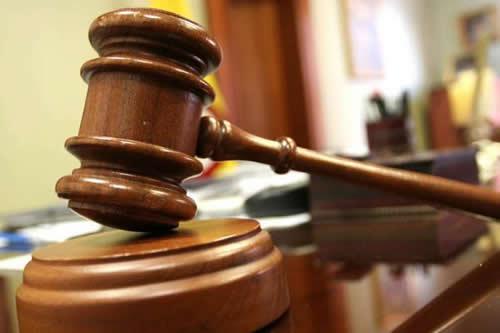
Photo: Radio Nuevitas
Camagüey – Jacqueline Ballester Aranda, the chief prosecutor of the Camagüey Provincial Public Prosecutor’s Office’s Criminal Prosecution Department, told Radio Cadena Agramonte that the biggest complaints in that territory were about the crime of spreading an epidemic.
Eight people are involved in this case because of refusals by travelers from abroad to comply with the social isolation required to preserve the health of their families and the community.
Also, four cases are being prosecuted for speculation and hoarding, based on the occupation of large quantities of deficient products, both food and hygiene, which are basic necessities for the population or essential to combat COVID-19.
A citizen was tried for the purchase of 18 liters of chlorine, with the aim of selling it at a higher price, and was sentenced to six months’ imprisonment, while another was charged with a similar amount.
On the other hand, 652 pounds of malanga and 175 pounds of rice have been recovered; in both cases, they were intended for illegal economic activity, and, for example, the defendant was marketing cereal at eight pesos a pound.
There was a robbery with force in a placita (point of sale of agricultural products) in the city of Camagüey, whose authors stole 38 sacks of potatoes and the weights of the unit. Those involved are already in custody and under investigation.
The Chief Prosecutor of the Department of Criminal Procedure of the Provincial Prosecutor’s Office added that demonstrations of contempt for the authorities, including the health and public order authorities, have been made against the request to place the nasobuco on the public highway and the indication of isolation in the centers authorized for such purposes.
The current Cuban Criminal Code imposes penalties ranging from three months to one year’s imprisonment for the basic offense of spreading an epidemic; from three to eight years for theft; from three months to one year for disobedience, illegal economic activity, speculation and hoarding.
Cuba Returns 2000+ Stranded Cubans


Cuba guarantees the return of more than two thousand Cubans stranded in 15 countries
Since the beginning of the spread of the pandemic, Cuban Consulates have provided timely information to Cuban nationals abroad on the evolution of the disease on the island and on consular procedures.
April 27, 2020
Translated and edited by Walter Lippmann for CubaNews.
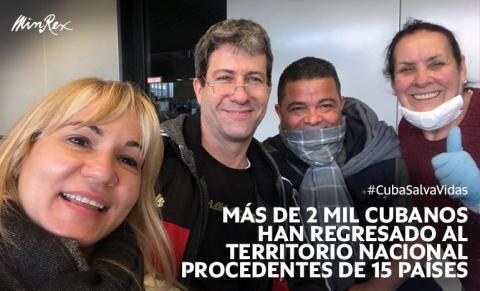
Photo: Cubaminrex
Since the announcement of the regulations on travel to and from Cuba, a measure adopted by the Cuban authorities as part of the national plan for the prevention and confrontation of COVID-19 as of March 20, more than 2,000 Cubans have returned to national territory, by air and sea, from more than a dozen countries, among them: Angola, Barbados, Dominican Republic, Guatemala, Guyana, Haiti, Honduras, Italy, Nicaragua, Peru, Portugal, Mexico, Panama and Equatorial Guinea, Cubaminrex reported.
These return flights of Cuban citizens and foreigners residing on the island have been organized between the competent Cuban authorities and their counterparts in each of the countries involved, in strict compliance with internationally established standards.
Since the beginning of the spread of the pandemic, Cuban Consulates have provided timely information to Cuban nationals abroad on the evolution of the disease on the Island and on consular procedures. At the same time, the Cuban authorities are permanently monitoring the situation of our nationals stranded in different countries, while efforts are being made, whenever possible, to ensure their return to our country.
Equally commendable has been the action of Cuban residents and members of solidarity organizations with Cuba, who have provided food, medicines and arranged cheap accommodations for Cuban citizens who are waiting to return to our national territory.
Hawks and Doves in the US Since Covid-19
Hawks and Doves in the US Since Covid-19

By Manuel E. Yepe
http://manuelyepe.wordpress.com/Exclusive for the daily POR ESTO! of Merida, Mexico.
April 15, 2020
Translated and edited by Walter Lippmann.
Finding the right balance between public security and personal freedom after COVID-19 “will require a review of everything we in the United States say we need to do in the interest of our security, which should involve moving away from militarized approaches to global problems to many other instruments of American power and influence.
This is what Christopher A. Preble, Vice-President of the CATO Institute for Defense and Foreign Policy in Washington DC, reflects in an article published in the magazine “Responsible Statecraft”, on the possible implications of the COVID-19 outbreak on the future of US foreign policy.
Among the responsibilities of many U.S. government officials is the identification of national security threats and prioritizing, among many options, the appropriate tools to address them.
Those who advocate increases in Pentagon spending – the so-called hawks in the language of the day – are likely to argue that resources should not be cut to the military to free up more resources for public health.
“We will soon be back to normal,” they will say from their perspective, “it would not be wise to redirect our national security strategy and spending to address one particular type of threat, at the expense of all others.
This is not exactly how politics responded after 9/11, but, in that case, the military eventually emerged victorious. In fact, anyone who opposed the militarized approach (that of the doves, who see the fight against terrorism as primarily an intelligence and law enforcement problem) was attacked by the hawks for not taking the threat seriously enough.
“Only a war would be enough; anything else would be naive, or even insensitive: a sign of indifference to the inevitable suffering of future victims of terrorist attacks.
That perspective, set a few days or weeks after 11 September 2001, has persisted. Even today, proposals to withdraw US forces from Afghanistan, for example, are met with serious warnings that this will increase the risk of future terrorist incidents in the United States. We are told that “only a continued, indefinite US military presence can manage this risk and the best we can do is to manage that danger.
Will such arguments survive the current crisis here at home? What politician will argue that Americans would have to die from COVID-19 today to ensure that other Americans are not killed by a terrorist in the future? And, will it be true that such military personnel so willing to “help” other countries are necessary to save our own?
The suggestion seemed absurd for generations, because the danger was not near, not even on the horizon. Now, it’s here.
If before it was considered naive to doubt that terrorism would represent a very serious threat to public security in the future, and skeptics were considered dangerously out of touch with reality, then the suggestion was not accepted,
Will the claims of the traditional defense hawks now come under greater scrutiny, without any senator or representative asking, for example, how that ship, tank or missile might function against a deadly pandemic?
In the post-September 11 era, a few dared to question whether the enormous expenses we had incurred amounted to unnecessary overreaction. But most Americans literally fell into that line.
The disease and its aftermath should provoke strong debate about how to preserve America’s national security.
In a peculiar twist, those who call for more spending to defeat the diseases could be called the hawks of the pandemic, while those who argue against it (and prefer that most resources stay in the military) become the doves.
The suggestion might seem odd, and the terms hawk and pigeon belong to more than just spending priorities. Because, even if the coronavirus didn’t change everything, it would necessarily change many things.
The senior leader of the Washington DC-based CATO Institute for Defense and Foreign Policy concludes that “finding the right balance between public security and personal freedom after COVID-19 will require Americans to review all the things we have to do to keep ourselves safe and to move away from a militarized approach to global problems.
Public Transportation Makes Adjustments


Public Transport Switches to
Direct Service for Essential Workers
In view of the logical concerns and worries in the population, caused by the paralysis of public transport in the country, Eduardo Rodriguez Davila, Minister of Transport (Mitrans), stressed the importance of understanding, support and discipline towards these provisions, in view of the progress of the new coronavirus
Author: Susana Antón | susana@granma.cu
April 13, 2020 21:04:09
Translated and edited by Merriam Ansara.
Edited by Walter Lippmann for CubaNews.
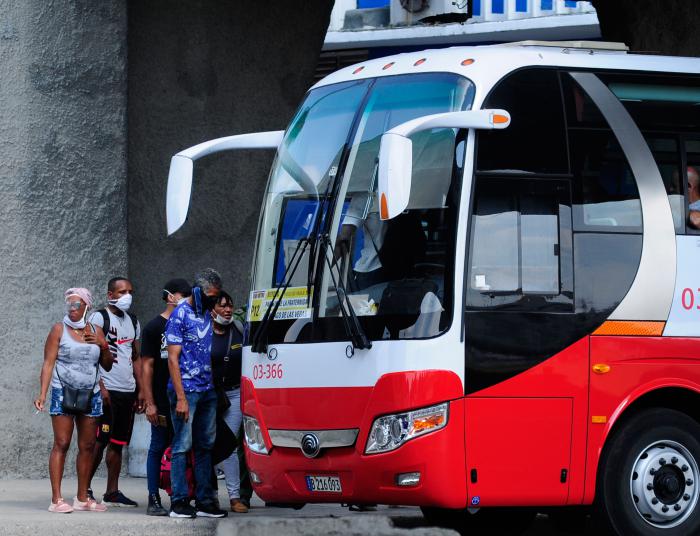
The new measures in transport seek to prevent the spread of VOC-19. Photo: Endrys Correa Vaillant
Responding to the logical questions and concern of the population over the suspension of public transportation in the country, the Minister of Transport, Eduardo Rodriuez Davila, remarked how important it is for people to understand, support and uphold these measures as necessary in the face of advancing COVID-19.
He explained to Granma, that the suspension does not for the moment include state vehicles that are used to ensure the functioning of the economy, nor privately owned personal vehicles which can circulate as needed, so long as they also are not creating traffic jams.
There is still also the movement of cargo, he said, as necessary to support the economy.
He confirmed that the mandatory suspension imposed Saturday, April 11, includes all public transportation both urban and inter-urban, includes both state and privately owned, and includes the support services for state vehicles.
Instead, transportation services have been organized for workers in the medical and health centers, commerce -related services, policing services and others defined by the Defense Councils (Civil Defense) throughout the country as essential activities.
He added that these are for specific workers at specific hours so that they can go and return from their places of work.
He said also that transportation has been guaranteed for all dialysis patients, people undergoing cancer treatments and in other situations of medical urgency. Information telephone lines have been set up at the main health centers in each municipality.
For these services as well, transportation reinforcements have been provided to all of the local defense councils, including ambulances and medi-buses.
He said that all transportation drivers concerned about the situation of their salaries should check with their own work centers which have been put in charge of administering the benefit directives of the Ministry of Labor and Social Security.
In terms of self-employed transporattion workers, Rodriguez Davila said that the current suspension of service applies for the moment to passenger and cargo transportation (including bici-taxis and buggies), and services related to these such as driving instructors and taxi stand managers.
The suspension applies to the operation of vehicles and does not include suspension of related activities such as vehicle repair, bodywork, or tire repair. These can continue so long as it does not lead to any gatherings of multiple individuals and that those involved observe the prescribed infection protection measures.
He said that for any further clarification or needs, workers in these services should direct themselves to the offices from which they have received their licenses.
The MINTRANS minister said he realized that there have had to be huge adjustments from the public transportation of passengers to transportation for designated workers.
All of these newly adjusted services have had to be carried out with strict adherence to measures of zero crowding, everyone wearing facemask, ensuring use of hypochlorite for hands before boarding and complete disinfection of the vehicles after each run.
Each day there will need to be adjustments to improve the new services and to avoid any adverse effects to essential services. He said that instructions had been given to all of the provinces to improve organization of the routes, schedule frequency and other elements that would ensure maximum efficiency of service and conservation of fuel.
He said that MINTRANS was also working with all of the main entities of the central government administration, the defense councils and the state enterprises involved in operation of port-to -transportation to economic distribution so as to guarantee timely distribution of the family ration basket of regular guaranteed goods and other measures to ensure the delivery of food and other basic products to the community.
He remarked that yesterday, Monday, because of the possibity of propagaiion of COVID-19, the Business Group for Automotive Transport Services had decided to close the Schools for Road and Driving Education to avoid gatherings of multiple individuals and had issued an announcement to this effect.
He announced that the deadlines for certificates, license renewals and psychological/physical driver exams for those whose documents were expiring had been extended until services were restarted in the related centers and offices.
Anyone who had already paid for the service at the time of the service suspension, who didn’t wish to continue the service could ask for 100% reimbursement of the amount paid.
Cuban Media in Battle vs. COVID-19
Media Near the Front Lines of the Battle Against COVID-19
by Yaymara Villaverde Marcé // Cuban News Agency
Translated and edited by Walter Lippmann for CubaNews
Guantanamo, 11 abr (ACN) After the heroic medical army, today on the first front of battle against COVID-19, there is also a commendable rear guard of professionals and essential workers, food producers, dependents, carriers, and journalists, recorder or camera in hand always present in times of contingency.
Every profession entails sacrifice, yes, and communicating in times of global health crisis a risk quota, a reality that challenges media institutions to unleash all the reporting and creative capacity of their journalists. They have reorganized their routines to ensure the safety of the guild and the time to inform the population in a timely and transparent manner.
We have that responsibility to our people and humanity-as Taimi Fernández, president of glove journalists, tells it, this is our duty to avoid misinformation. More so in this difficult context where accurate guidance is needed, from reliable and scientific sources, to raise public perceptions of risk and encouraging preventive behavior.
Information is a vital tool, a way to fight the new coronavirus and its spread-points out. The responsible press must take advantage of the influence that the media exert on the collective consciousness, with reliable and contrastable data that cut the wings to rumors and false news that only generate confusion and hinder an effective response.
Consequent with the decisive measure of social isolation and confinement, the Cuban media has redesigned its daily dynamics, strengthened the teleworking modality to reduce the influx of professionals and technicians, and have exempted those with chronic suffering from risks which make them vulnerable in this epidemic scenario.
This is how Mabel Pozo, director of the radio station CMKS Guantanamera, where today the necessary health and protection measures are taken. She works with the essential staff, programming was adapted to the context shee points ou, and this and the views of the people are monitored by specialists, depending on which deliveries move.
Similar strategies assume reporters and technicians of the newspaper and provincial television. There, several take advantage of remote work, in an informative reality in which mobile journalism intensifies, taking advantage of the potential of smartphones and basic technologies to generate content and products communicative for online platforms.
Lisván Lescaille, in front of Telecentro Solvisión, tells us that his medium reduced active staff-as a first step to protect vulnerable groups – adjusted the billboard by prioritizing three information magazines with the theme COVID-19 and invited experts, and working groups were created both on the streets and from homes, through social media.
Ariel Soler, Head of Information of the weekly “Venceremos”, spoke of vital hypermedial work in this context spoke about the journalistic exercise in which their reporters are inserted, six with corporate mobile phones and others with the Internet in their homes, with whom the editorial board of the journal organizes the work by phone, giving special follow-up to the epidemiological situation.
And nothing more revealing than the opinion of the people regarding this work, like that of the septuagenarian Guantanamera Dalia Aguilar, of those sharp to which no one makes a story, who told the ACN that no report from the national press is lost and local, “because warfare well warned does not kill soldier”, and thanks the professionals in that sector for their credibility.
Last March Ricardo Ronquillo, President of the Union of Journalists of Cuba (UPEC), sent recognition to the professionals of the country’s public media system, for the extraordinary informative work in the confrontation of the global pandemic, urged to join this campaign to all communication platforms, and take institutional measures to protect the guild.
Journalists are close to the first line of battle against the disease, because they have to report what is happening around it in Cuba, so it is important to the media to ensure its protection, he stressed.
These are times to act quickly and informative transparency said Ronquillo in a meeting of the expanded presidency of the organization and emphasized-” UPEC is not demobilized, on the contrary, we must now unleash all the creative capacity to make visible to public opinion, national and international, the work of the media”.




The Coronavirus and the Crusade Against 5G

The Coronavirus and the Crusade Against 5G
Unique UK fires fuelled by conspiracy theories highlight the importance of fact-checking and maintaining common sense in the face of the SARS-CoV-2 pandemic
 By Yurisander Guevara
By Yurisander Guevara
guevara@juventudrebelde.cu
April 8, 2020
Translated and edited by Walter Lippmann for CubaNews.
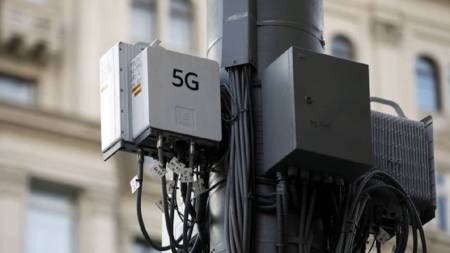
There is no scientific evidence linking 5G to COVID-19 Author: The Verge Published: 08/04/2020 | 08:49 pm
Conspiracy theories are generally harmless phenomena that rely on circumstantial issues to generate questions that often go unanswered. Thus, they sow doubt about a topic and generate debates that, in this age of the Internet everywhere, become endless.
However, when one of these theories causes consequences in the social fabric, it can already be described as dangerous. This is what is happening right now in the United Kingdom, where several telephone poles with 5G transmitters have been burned in some cities. These facts that are linked to an evil rumor that is spreading like wildfire in the networks, taking advantage of the social hysteria generated by SARS-CoV-2.
According to the “conspirators”, the deployment of the fifth generation of mobile data transmission technology, or 5G, is linked to the COVID-19 pandemic, which has led to the burning of transmitters, a sign of the panic caused by the epidemic.
Theories
Rumors and conspiracy theories about a link between the launch of 5G and the spread of the coronavirus have spread mainly through social networks. There are groups on Facebook and Nextdoor, where thousands of members repeat false and misleading claims that 5G is supposedly harmful.
The theory claims that the new coronavirus originated in Wuhan because the Chinese city had recently launched 5G. Supposedly it has now spread to other cities that also use this technology.
It is the hottest hoax on social networks these days, after another one was dismantled, claiming that the SARS-CoV-2 virus was created for obscure geopolitical purposes. In this last case, the theory falls apart with a study entitled The Proximal Origin of the Coronavirus, published in the journal Nature Medicine.
Research compares the ribonucleic acid sequence of this microorganism with that of other coronaviruses such as SARS and MERS, and bases its conclusions on the characteristics of a protein called spike. This spike is found in the external envelope of the virus and has a sort of hook through which it attaches to human cells. This “ability” of the pathogen is essential in its ability to infect people, one of its most damaging characteristics.
And it is so perfect, according to the study, that “it is most likely the product of natural selection (…) strong evidence that SARS-CoV-2 is not the product of self-serving manipulation”. In the same sense, and even more categorically, researcher Kristian Andersen, from Scripps Research Institute, in Florida, United States, stated in La Repubblica, an Italian publication: “Confronting the generic data available today on the various types of coronavirus, we can resolutely state that SARS-CoV-2 is the result of natural processes”.
In the case of the theory linking 5G to the new coronavirus, there is no more than investigating the properties of this new technology, so-called because it is the fifth generation of mobile phone networks, designed to multiply the connection speed of our portable devices tenfold.
Those who defend the theory claim that 5G weakens the immune system, emitting harmful radiation and therefore facilitating the entry of the coronavirus into the body. They also add that viruses use radio waves to communicate.
The first “argument” collapses when we look at the radio spectrum. At the low-frequency end of the spectrum, we find the radio waves used by 5G. Therefore, this technology does not produce ionizing radiation and does not damage human DNA, which other frequencies such as X-rays or ultraviolet light, responsible for causing diseases such as cancer, do.
According to the AS newspaper, “radiation emitted by radio waves is at a similar level to that produced by televisions and natural light. It is true that this new generation is a bit above its predecessors in this type of emissions. It is also true that, according to Ofcom – the UK’s telecommunications regulator – the maximum it can generate is 66 times below the safety limit.
The Department of Health in England adds that 5G “should have no impact on public health” and the World Health Organization has included 5G under heading 2B of carcinogens. That is, among those not proven to be capable of producing cancer. According to this classification, it would be as potentially carcinogenic as coffee.
The second argument is pure fantasy, while there are no studies that point in that direction. There are, however, that admit that this communication through radio waves could occur between bacteria (in no case between different viruses). For example, there is a study by a group led by Allan Widom at Northeastern University in Boston, USA, whose conclusions have been discussed by the prestigious Massachusetts Institute of Technology.
The facts
Despite all the evidence that disproves this crude conspiracy theory linking 5G to SARS-CoV-2, UK territories such as Birmingham, Liverpool and Melling have been the scene of cell tower fires in recent days.
The UK’s Department for Digital, Culture, Media and Sport tweeted that “there is absolutely no credible evidence” of a link to the conspiracy theory, while commercial agency Mobile UK said such rumours and conspiracy theories were “worrying”.
UK telecoms operators now believe the attacks undermine the nation’s security. According to a tweet from Vodafone’s chief executive officer there, “this is now a matter of national security. The police and anti-terrorist authorities are investigating.
There have even been reports of harassment of telecommunications workers as they deployed fibre optic cables, as witnessed by a video also broadcast on Twitter by a BBC reporter.
The truth is that Iran, for example, is among the nations most affected by the new coronavirus, and there is not a single 5G tower there. There’s lots of evidence that dismantle this misleading theory, but the emotional fragility begins to make a dent. 5G is not a factor in its spread. Globalization is. And once the virus enters a territory, social isolation is the most effective measure to prevent its spread.
For our readers, who today are contributing to the great global battle against SARS-CoV-2 by staying at home, here is some advice: follow only official information from authorities about the pandemic and do not contribute to the networks that expand the reach of false news. We already see how harmful and dangerous it can be to feed on unverified facts, especially when the situation we are living in requires poise and a lot of common sense.
A Frenchman Who Saw the Sun Again

The Frenchman Who Saw the Sun Again in the Isolation Center in Matanzas
This white-bearded man conveys with his clear eyes the immense gratitude that neither resources nor tiredness nor sleep were spared in order to save him
 By Hugo Garcia digital@juventudrebelde.cu
By Hugo Garcia digital@juventudrebelde.cu
April 9, 2020
Translated and edited by Walter Lippmann for CubaNews.
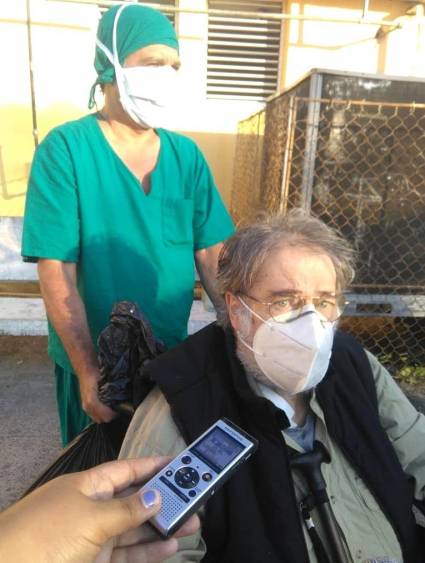
Jack Gaetan Joseph Villiers, Discharged Patient Author: Jessica Rufin Posted: 09/04/2020 | 07:36 pm
Jack Gaetan Joseph Villiers is a Frenchman who is miraculously alive. It’s as simple as that. But the miracle has also come about because of the proven professionalism of Cuban health.
“This is the first time I’ve seen the blue of the sky after almost 20 days of admission,” he said in a choppy voice from the wheelchair in which he was being transferred to the ambulance that would take him to Havana.
This man with a graying beard conveys with his clear eyes the immense gratitude that no resources, no tiredness, no sleep were spared to save him.
“But I feel good already. When all this is over, we will return to Cuba,” he whispered in his deficient Spanish as he said goodbye to the bus at the Mario Muñoz Monroy Hospital’s isolation center, becoming the sixth confirmed positive patient of the COVID-19 to be discharged in this city.
“Now I can confirm what my brother, who is a doctor, said about the capacity of Cuban doctors, who have specialized in fighting pandemics and diseases like these,” the Frenchman stressed to the Matanzas television and radio media.
Dr. Juan Carlos Martin Tirado, director of the hospital, confirms that this is another achievement of Cuban medicine, because this patient had many of the expected complications at his 72 years of age, including heart disease, hypertension and a major underlying diabetes mellitus.
Martín Tirado praised the delivery of the multidisciplinary team of intensive care, which worked day and night to save the patient.
Brave Ones: Revealing Faces, Beatriz

BRAVE ONES: Revealing Faces, Beatriz Rodríguez
April 12, 2020
Translated and edited by Walter Lippmann for CubaNews.
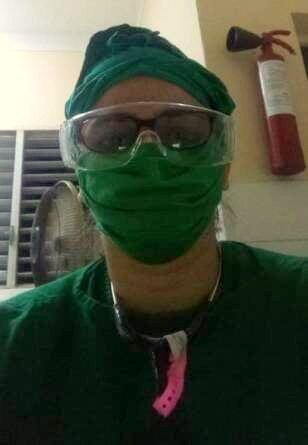
Beatriz Rodriguez Sandeliz is 30 years old. She is a First Grade Specialist in Pediatrics and head of the Respiratory Service of the Children’s Hospital “José Luis Miranda”, in Santa Clara, Villa Clara. Dr. Beatriz formed, in the beginning, together with Dr. Marbin Machado Díaz, also from the Children’s Hospital and Drs. Lissy Pérez Leal and Richard Godoy León, from the “Manuel Fajardo” Military Hospital, the team of eight pediatricians who, at present, attend to infants who are contacts, suspects or infected with the SARS-CoV-2 coronavirus.
“If they knew how hard it is to see a 12-year-old girl crying because her PCR has tested positive, we wouldn’t be so irresponsible and would stay home. It hurts to see a helpless child cry because we have not been consistent and have failed to protect those who are the hope of the world,” says this young doctor with only six years of training, three of them as a pediatrician.
(Texts and photos by Yudith María Delgado Rodríguez and Félix Alexis Correa Álvarez)

Subscribe to Blog via Email
| M | T | W | T | F | S | S |
|---|---|---|---|---|---|---|
| 1 | 2 | 3 | 4 | |||
| 5 | 6 | 7 | 8 | 9 | 10 | 11 |
| 12 | 13 | 14 | 15 | 16 | 17 | 18 |
| 19 | 20 | 21 | 22 | 23 | 24 | 25 |
| 26 | 27 | 28 | 29 | 30 | 31 | |


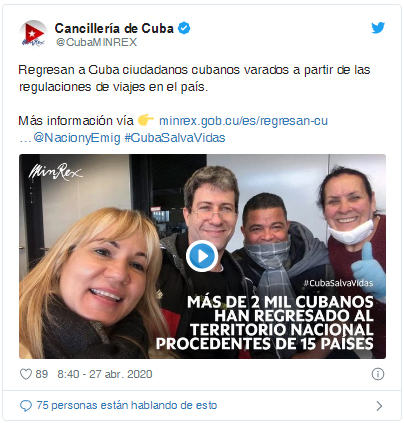

You must be logged in to post a comment.